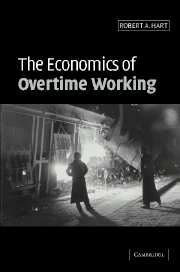Book contents
- Frontmatter
- Contents
- List of figures
- List of tables
- Preface
- 1 Overview
- 2 Facts and figures
- 3 The overtime decision
- 4 The overtime premium
- 5 Overtime hours and empirical studies
- 6 Overtime pay and empirical studies
- 7 Policy issues
- 8 Is overtime working here to stay?
- References
- Index of names
- Index of subjects
2 - Facts and figures
Published online by Cambridge University Press: 22 September 2009
- Frontmatter
- Contents
- List of figures
- List of tables
- Preface
- 1 Overview
- 2 Facts and figures
- 3 The overtime decision
- 4 The overtime premium
- 5 Overtime hours and empirical studies
- 6 Overtime pay and empirical studies
- 7 Policy issues
- 8 Is overtime working here to stay?
- References
- Index of names
- Index of subjects
Summary
At the level of the firm, the quantitative significance of overtime working is best described in terms of its contributions to physical labour input and to labour cost. On the input side, suppose for simplicity that all workers in the firm are full-time employees and that they all work, at least, the maximum number of standard hours. Then, answers to four key questions are required in order to assess the quantitative importance of overtime:
What is the size of the firm's workforce?
What is the maximum number of daily or weekly standard hours?
What proportion of the firm's workforce works overtime in any given period?
How many per-period hours of overtime do overtime workers work?
Through time, information on (1)–(4) allows us to establish changes in the firm's total overtime requirement. In the next period, and for given output, the total would rise if, ceteris paribus, there were rises in the workforce size, the proportion of workers working overtime, the number of overtime hours worked by overtime workers and if maximum standard hours were reduced.
In evaluating the cost side, the following four questions with respect to overtime workers are of key importance:
Are overtime hours paid or unpaid?
For paid overtime, what is the marginal hourly rate of pay?
Does the rate in (2) vary with the number of per-period overtime hours?
Are the standard hourly wage rate and the overtime premium functionally related?
- Type
- Chapter
- Information
- The Economics of Overtime Working , pp. 11 - 42Publisher: Cambridge University PressPrint publication year: 2004



